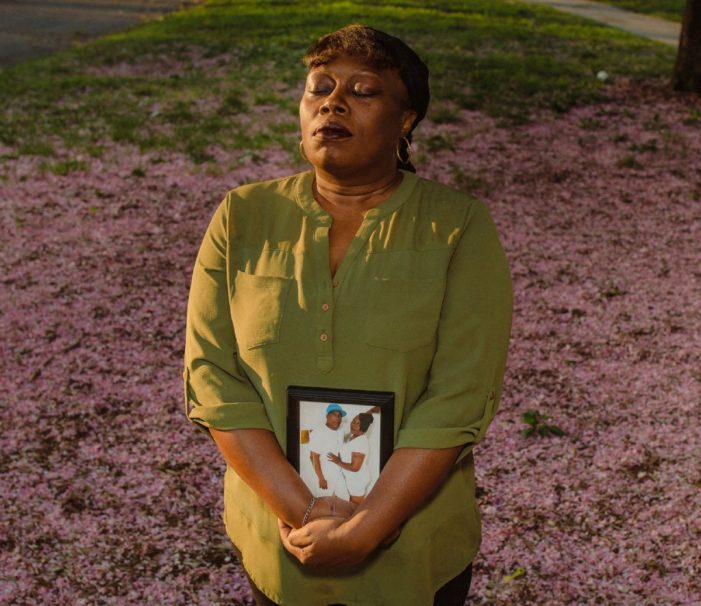Rosalyn Washington’s husband, Gary, 56, died from Covid-19 the day before their wedding anniversary. (Credit: Sara Naomi Lewkowicz for The New York Times)
By Nicole Hong, NY Times
They did not treat patients, but Wayne Edwards, Derik Braswell and Priscilla Carrow held some of the most vital jobs at Elmhurst Hospital Center in Queens.
As the coronavirus tore through the surrounding neighborhood, their department managed the masks, gloves and other protective gear inside Elmhurst, a public hospital at the center of the city’s outbreak. They ordered the inventory, replenished the stockroom and handed out supplies, keeping a close count as the number of available masks began to dwindle.
By April 12, they were all dead.
The pandemic has taken an undisputed toll on doctors, nurses and other front-line health care workers. But it has also ravaged the often-invisible army of non-medical workers in hospitals, many of whom have fallen ill or died with little public recognition of their roles.
The pandemic has taken an undisputed toll on doctors, nurses and other front-line health care workers. But it has also ravaged the often-invisible army of nonmedical workers in hospitals, many of whom have fallen ill or died with little public recognition of their roles.
Her husband, Edward Becote, made about $45,000 a year moving patients around the Brooklyn Hospital Center on stretchers and wheelchairs. He was among at least 32 non-medical hospital workers in New York City who have died during the pandemic, according to an analysis by The New York Times.
These workers make some of the lowest wages in hospitals, and they are more likely than medical staff members to be black or Latino. In New York City’s public hospitals, 79 percent of the workers who assist doctors and nurses are black or Hispanic, compared with 44 percent of the medical staff, according to the most recent city data.
In the early weeks of the pandemic, when even emergency room nurses had to reuse N95 masks for days at a time, nonmedical workers were often given less protective gear than their colleagues who treated patients — or none at all — according to union leaders and hospital employees.
“If you work in a hospital, you are exposed to the same kind of virus as the doctors and nurses,” said Carmen Charles, president of the union that represents 8,500 nonmedical staff members at New York City hospitals. “I understand management wanting to ration the supplies, but at what cost?”
Ms. Charles, who leads Local 420, part of the umbrella union for city workers, said some of her members had been denied the N95 masks that were reserved for doctors and nurses. At least 11 members have died, she said.
A spokesman for Health and Hospitals, the city’s public hospital system, acknowledged that it saved N95 masks for clinical employees who treated Covid-19 patients and other employees in “hot zones,” such as the emergency department. Early in the pandemic, the spokesman said, most government guidance on masks focused on clinical employees. He said the agency offered surgical masks to its nonclinical workers.
Elmhurst did not require every employee to wear at least a surgical mask until April 15, the same day Gov. Andrew M. Cuomo announced an order mandating New Yorkers to wear face coverings in public, according to emails viewed by The Times.
In March, Ms. Carrow, Mr. Edwards and Mr. Braswell handed out supplies in the materials management department, in the hospital’s subbasement. Their deaths have shaken other nonclinical employees at Elmhurst who hoped that their distance from patients offered some protection against contracting the virus.
Ms. Carrow, 65, died on March 30 after working at Elmhurst for 25 years. Mr. Edwards, 61, died two days later, after a friend found him on the floor of his apartment, gasping for air. Both of them had expected to retire within the next year.
Mr. Braswell, Mr. Edwards’s supervisor, died on April 12. He was 57.
“As you start mending your heart for one, then the next one came,” said Gary Johnson, who previously worked in their department and discovered Mr. Edwards in his apartment. “You wonder when the pain stops.”
Hospitals generally have not released the names of employees who have died, leading workers to collect the names through word of mouth and organize their own memorials. The Times compiled its list through obituaries and interviews with hospital employees and relatives.
At the Brooklyn Hospital Center in Fort Greene, at least five employees have died in recent weeks, according to interviews.
Rafael Cargill handled medical records at the hospital, including sometimes retrieving them from floors with virus patients, said his sister, Lillian Cargill. She said that he was concerned about a colleague who showed up to work despite testing positive for the virus, and that he had not received any protective gear when he developed a dry cough in late March.
Mr. Cargill, 60, died at home on March 30.
“We ran over there and had to stand outside,” his sister said. The paramedics “wouldn’t allow us to go in. They came out and said they couldn’t save him.”
Kim C. Flodin, a spokeswoman for the Brooklyn Hospital Center, said the hospital was following state and federal protocols to “protect our staff, clinical and nonclinical, from the transmission of this virus.”
It is difficult to pinpoint how any hospital employee contracted the virus; many commute by public transit and live with family members who are also unable to work from home. But anyone working in hospitals inundated with patients was potentially exposed.
In a lawsuit filed on April 20, the largest nurses’ union in New York accused the state’s Department of Health of enacting policies that turned hospitals into “petri dishes where the virus can fester and then spread to other health care workers.”
Nurses and other health care workers were denied testing even though they exhibited symptoms, the lawsuit said.
In response, a Health Department spokesman said the state was taking every step to ensure health workers have the support and supplies they need.
That support may have come too late for Adiel Montgomery, who worked as a security guard in the emergency department of Kingsbrook Jewish Medical Center in Brooklyn.
He spoke out in March about lacking the protective suits that he saw doctors wearing around Covid-19 patients, according to a colleague who spoke on the condition of anonymity out of fear of retribution. After Mr. Montgomery and other security guards complained, the colleague said, more protective gear arrived.
In late March, Mr. Montgomery lost his sense of taste and smell and experienced flulike symptoms, according to his brother.
Mr. Montgomery, 39, was hospitalized at Kingsbrook a week later with chest pains. While waiting hours for the results of his blood work, he began coughing up blood.
He died on April 5. The hospital told his family that he died of a heart attack, but his family believes he had the virus.
“I just feel that being an employee of the same hospital, he was neglected,” his mother, Griselda Bubb-Johnson, said. “I feel they should have done more.”
After the deaths of at least five Kingsbrook employees, nurses there protested outside the hospital about the shortage of protective gear. A spokeswoman for Kingsbrook did not respond to multiple requests for comment.
Many hospital employees worked as long as they could after they felt sick, driven by financial necessity and a desire to help their overstretched colleagues.
The last day Gary Washington reported to work at NewYork-Presbyterian Allen Hospital in northern Manhattan was March 29. His body was aching, and a colleague saw him lying down in the cafeteria.
Rosalyn Washington, his wife, thought he was growing too old to keep working as a housekeeping employee there. He cleaned the rooms of virus patients after they were discharged, and his brother thought he should stop going to work, she said.
So many housekeepers called out sick that the hospital began bringing in temporary workers, one of his colleagues said. But Mr. Washington was the family’s primary breadwinner.
“He was not going to quit his job and not take care of his family,” Mrs. Washington said.
Mr. Washington, 56, died from the virus on April 8, the day before his wedding anniversary.
Before his death, he texted his wife from his hospital bed: “I can’t explain how much I truly love you. I didn’t want to tell you how I cried like a baby thinking about how good you’ve been to me.”
His wife had his urn engraved with Boop P Doop, the pet name they called each other.
“I had 25 years with this man. I’m so empty. Now I’m getting calls about widows’ benefits,” she said, her voice breaking. “He’s trying to take care of me still.”

